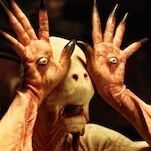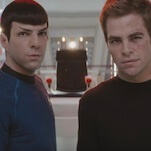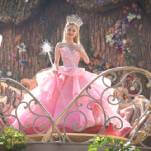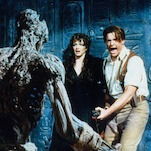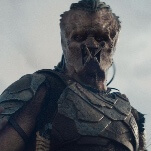“Dark Page” (season 7, episode 7; first aired: Oct. 30, 1993)
Or The One Where Lwaxana has a secret
So then—the last Lwaxana Troi episode. Well, the last Lwaxana Troi TNG episode, at least. (She has three more appearances on Deep Space Nine, apparently.) The last time we saw her was in season five’s rather dreadful “Cost Of Living,” which had all kinds of terrifying things like floating clown heads and Alexander sulking, but fortunately, neither of those are in evidence in “Dark Page.” Although once again, we have an episode where someone wanders around someone else’s dreamscape, so you can expect lots of strange camera angles, unsettling sound design, and freaky imagery. As Lwaxana eps go, this isn’t a particularly painful one, in no small part due to the fact that she spends a good half of the time unconscious. It’s also an episode that takes a big risk in terms of her character development, creating out of whole cloth a tragedy in her past—the sort of event which should, really, have been affecting her whole life since. The question here is, can those of us who’ve been with the show since the beginning credibly apply this tragedy to the character in retrospect?
The setup (and I’ll mention here that the first line of my notes for this episode reads “LWAXANA TROI,” like some final howl of a damned soul): Lwaxana is serving as a liaison to the Cairn, a race of beings who communicate with each other solely through telepathy. Which makes me wonder why they have mouths at all, but whatever. The Cairn are interested in joining the Federation, but they need someone to teach them how to talk to non-telepaths, which is where Lwaxana comes in. As a full Betazed, she can participate in their mind-speak, and, as we’ve had ample opportunity to enjoy in the past, she’s very practiced at the art of spoken conversation as well. After spending some time on their planet, Lwaxana and few select Cairn citizens (an adult male named Maques, and his daughter, Hedril, played by a young Kirsten Dunst) are now aboard the Enterprise, as Maques and Hedril attempt to mingle with the crew and expand their knowledge of oral interaction. But while the two Cairn make a decent job of it, something’s wrong with Lwaxana.
At first she seems her regular, overly charming self. She tries to force Maques in Deanna’s direction, telling him that Deanna is single and desperate for a man, ha-ha. But then she starts getting headaches. She stumbles into Ten-Forward, sees Riker and Troi having a conversation, and starts shrieking at Riker for ruining Deanna’s life. And finally, while the meeting with the Cairn and other crewmembers in the Enterprise’s arboretum (Betcha forgot we had one of those, didn’t you?), she collapses. Troi talks with Maques about the incident, and he struggles to explain something he’s noticed in Lwaxana during their time together—a “dark” part of her mind that he can’t access. Because of the strain of her work with the Cairn and her need to block off a certain segment of her past, Lwaxana has been driven past her breaking point, and now lies in a coma, fading quickly. Deanna, with Maques’s help, needs to form a link with her mother and trying and figure out exactly what’s bothering her, and force Lwaxana, for the sake of her life, to face her trauma and come out the other side.
Writing that all out here, I’m not sure I entirely buy it. It makes sense that Lwaxana’s contact with the Cairn would put her under a lot of stress, and, given how big a secret this turns out to be, you’ve got to imagine that the elder Troi has been making a concentrated effort to keep Deanna from sensing it, as well as any other Betazed she’s encounter over the years. That’s a substantial effort, and you could, if you wanted to, use this to justify some of Lwaxana’s excesses. Maybe she pushes so hard for Deanna to marry and start a family because she understands how precious life is, and because she’s basically a quarter crazy from having to split her mind down the middle for so long. That makes some sense. It’s just convenient that it turns out to be so life-threatening in this case. I don’t want make a huge issue over this, because I think the episode (which I didn’t hate) has another, bigger problem, but this is a step away from “She’s dying of a broken heart,” even with the technobabble we get about Betazed brain physiology.
So, much like Picard and Geordi did with Data at the end of “Phantasms,” we have Deanna wandering around Lwaxana’s mind, looking for answers. It’s a bit unusual that, for the most part, Lwaxana’s mind manifests itself with sets from the Enterprise, and there’s nothing here that’s comparable to the eeriness of Data’s nightmares, but it’s trippy enough. It’s too bad this episode fell so quickly after “Phantasms,” as that takes away some of the oddness; ho-hum, just another brain-melding story, we do those all the time around here didn’t you know? Still, it’s fun to see the various ways unconscious Lwaxana tries to prevent Deanna from figuring out the root cause of her disturbance. There’s a fake Picard who shows up almost immediately; an attack wolf (why a wolf, of all things, I don’t know); and Lwaxana herself. Hedril appears in the dreams, and when Troi tries to approach her, Lwaxana freaks out. There’s a mystery here, and between sessions inside her mother’s head, Deanna tries to piece together what Lwaxana’s hiding. At first, she thinks there must be some connection to Hedril, as the girl keeps appearing in the elder Troi’s mind, but in real life, Hedril seems fine, and this isn’t the sort of show to have something unpleasant going on between Maques and his daughter. But then Troi realizes (after advice from Data, which actually references “Phantasms” in a semi-oblique way) that dreams have symbols, and that dream-Hedril could be representative of something else. With Picard’s help, Troi realizes that a period of entries from her mother’s journal have been deleted—a period covering seven years, ending just after she was born. So something happened. Something with a young girl.
It turns out Deana wasn’t Lwaxana and her husband’s first child. They had another girl named Kestra, who drowned, and in the time since then, Lwaxana has done everything in her power to hide this knowledge away. It’s a somewhat powerful scene when Troi finally uncovers all of this, and it’s sad in a way that TNG doesn’t often allow itself to be, acknowledging that even in a utopia, sometimes, bad things happen for no reason. Watching the episode, my initial response was to be frustrated by the out-of-left-field nature of this revelation. We’ve never had any hints of this in the past, and while I realize that TNG is not a heavily serialized show, and that this sort of twist can exist semi-plausibly in that context, this is something that’s so major, it’s a lot of ask of an audience to just accept it and move on. Poor Kestra isn’t really the issue here, either; it’s the idea that Lwaxana has spent so long hiding the existence of her first child. I don’t even know how that would work in the future. Her husband was a Starfleet officer, wouldn’t this be listed in his records? Wouldn’t there be a mention of a sister in Troi’s own history or medical records or something?
That’s not what really bothers me, though. As annoyed as I’ve been with Lwaxana in her various appearances over the years, I do appreciate that she’s a consistent character, and she’s occasionally been a fascinating one as well. “Dark Page,” intentionally or not, calls all this into question. Her whole philosophy of embracing life, being true to herself, annoying the hell out of Picard with her randiness—suddenly, this is all connected with her daughter’s death. I’m not sure if it’s intentional or not, but when a long-running show pulls out a major twist of this nature, it throws a familiar character into a new light, and, much as I can’t believe I’m typing this, that does Lwaxana a disservice. It’s too close to making her a victim. There are ways you could’ve played this which would’ve been more effective, but as is, “Dark Page” is a not-too-terrible episode which nonetheless points to what’s becoming something of a theme for the seventh season: a show that’s working so hard to make an impact that the care and attention it used to put into characterization is in danger of being lost.
Grade: B-
Stray observations:
- Maques’s “I’m being serious” face is absolutely hysterical.
“Attached” (season 7, episode 8; first aired: Nov. 6, 1993)
Or The One Where Beverly Reads Jean-Luc’s Mind
This could’ve been a great episode. It very nearly is, in fact. Whereas “Dark Page” tries to create a brand new emotional moment in the guise of something buried, “Attached” serves as the pay-off for something that’s been building ever since the start of the series: the relationship between Jean-Luc Picard and Beverly Crusher. Over the course of this episode, Picard and Crusher are forced to face their feelings for one another in the most direct way imaginable, and it generates some of the most quietly moving exchanges we’ve seen on the show. For once, two adults discussing their feelings for each other on this show doesn’t come off as shallow or immature, and that has a large part to do with all the groundwork between them that’s already been laid. (So to speak.) Yes, it would’ve been nice if the show had dealt with this a little earlier, but I’m relieved they dealt with it at all, and I guess it is the sort of big moment you want to save for close to the end. So yeah, this could’ve been great.
What keeps it from being great is the ending. It’s one of the worst cases of “We can’t change the status quo!” this show has ever done, and while I wouldn’t go so far as to say it cheapens everything that comes before it, it does undo a lot of what “Attached” tries to accomplish. Decisions which exist primarily to serve the interests of a show over the interests of the characters are tricky to pull off. They can work, but there needs to be more of an allowance made toward helping the audience suspend disbelief. Since most of us are aware that what we’re watching is a written work, there’s always that voice in the back of our minds checking the integrity of what we see. We want to believe the author is playing fair with us; we know none of this is real, but we want to pretend it is, and we need to feel like the author is pretending along with us. So when something happens that seems overly convenient in serving that author’s needs, a plot development or character choice that keeps the story on a familiar path instead of sending everything off the rails, well, we question that. It’s possible to justify what happens at the end of “Attached” as character-driven, but the episode barely even tries. And that’s a shame.
The Enterprise is visiting Kesprytt III, where a race called the Kes is looking to be allowed into the Federation. The problem is, the Kes aren’t the only race living on Kesprytt, and the other race, the Prytt, are isolationists who refuse to even make contact with outsiders, let alone negotiate with them. The Federation doesn’t make a habit of allowing planets in who aren’t unified in their desire to join, for obvious reasons. If you have to two dominant races that aren’t on great terms with each other (as the Kes and Prytt clearly aren’t), and one suddenly has a connection to the vast network of resources and technology that the Federation represent… well, this is the sort of situation the Prime Directive was made for, isn’t it? I suppose it’s a sign of open-mindedness and optimism that the Enterprise were willing to show up at all. Jean-Luc and Beverly are to beam down to meet with Kes representative Admiral Mauric, but something goes wrong, and the two wake up in a Prytt detention cell. The Prytt are convinced that the Kes are working with the Federation to build a military base on the planet, so they’ve kidnapped the captain and the doctor, implanted them with neural devices, and are just waiting now to extract information about their plans.
To be honest, the first part of this episode is a bit on the silly side, a lot of elaborate maneuvering to get us to the main event. Once Picard and Crusher escape the Prytt base (with help from a secret Kes double agent), the episode divides into two stories: the captain and the doctor’s adventures in the Kesprytt countryside, and Riker’s increasingly frustrated attempts to make both the Kes and Prytt governments see reason. The latter plotline is fun, although it once again seems to be there mostly to remind us how silly paranoia-driven politics can be, and how wonderful it is that the Federation has risen above all that nonsense. I’m being a bit harsh, because really, watching Riker negotiate with a couple of equally arrogant morons is entertaining enough to justify its presence. It’s just, none of this has much to do with the Picard-Crusher scenes, apart from ensuring they’re isolated for a certain period of time, and the Kes-Prytt relationship seems underdeveloped by the end, more a stereotype than an actual entity worth our time.
But hey, the planet-side conversations between Beverly and Jean-Luc are very well done. Once you accept the contrivance of the mind-reading neural devices, it’s fascinating to watch how the two slowly realize they’re reading each other’s thoughts, and how being aware this is happening raises some issues both of them had thought long buried. There’s a bit of sniping, but none of it ever seems mean-spirited or damaging to their friendship, which is, I think, nicely observed; after a certain point of knowing someone for so long, you start to get a sense of what they’re saying even when they aren’t saying it. Beverly is surprised to find out that Picard is often faking it when he makes strong, clear decisions, and she also realizes he hasn’t been enjoying the elaborate breakfasts she prepares, but they are so cemented in their roles that none of this really affects anything. It would’ve been possible to make this into some kind of harrowing psychodrama, but TNG takes a lighter, while still thoughtful, approach, and serves both characters well.
The big reveal here is, of course, that Picard is in love with Beverly. Or was in love, at any rate; he knew her before she married Jack, and once their relationship was secure, Picard didn’t feel it was his place to say anything. He was also reluctant to have her aboard the Enterprise, but he claims that once he saw her again, the issue resolved itself for him, and he no longer had the same feelings. But this isn’t the whole truth, as the final scene of the episode makes clear. The chemistry between these two actors has always been strong, and while it makes sense that Picard wouldn’t feel the same for Beverly as he did when they first met, in the time since she came on board his ship, a new sort of attachment has formed between them; one that’s more relaxed, less driven by intense passions than it is by mutual respect, but still just as warm and intimate. That may be conjecture on my part, but all those shared meals and conversations we’ve already seen read like scenes between two close friends who are holding back from being more out of fear or respect for the dead or some other combination of the two.
That’s why the ending is so frustrating. Jean-Luc and Beverly eventually make it back to the Enterprise after Riker elbow-bends the various factions into letting them go. They meet for dinner in Picard’s quarters after they’ve both had the neural implants removed, and after discussing their experience, Picard makes his move. And Beverly turns him down. Conceptually, I don’t have a huge problem with this, as there are plenty of arguments you could make to keep the two apart. Maybe Picard reminds Beverly too much of her dead husband, or maybe Picard can’t stand to be in a relationship with someone on his ship after his last relationship went pear-shaped. But all we get is Beverly saying, “Or perhaps we should be afraid.” That’s it. After spending an entire episode establishing how good a couple these two would be, how well-suited they are for each other and how much they love each other, “Attached” chickens out in the end, and doesn’t even have the decency to pretend it’s doing anything else. At its best, “Attached” is a great example of how a long-running show can use its wealth of history to create resonant character moments that stem naturally from everything that’s come before; at its worst, it’s a great example of how long-running shows can compromise themselves out of a desire to avoid change. The latter doesn’t ruin the former, but it does deflate what might have been a classic.
Grade: B+
Stray Observations:
- The Prytt outfits are ridiculous. At times, that whole subplot seems like something that had leaked through from the original Trek.
- “You’re acting like you know exactly which way to go, but you’re really only guessing. Do you do this all the time?”
Next week: The Enterprise encounters a “Force Of Nature,” and Data has to deal with his “Inheritance.”














